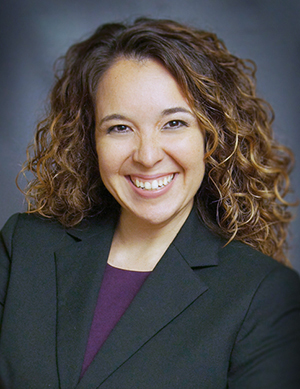 TOPEKA—Danielle Hall believes that for some lawyers, the stress of managing a law practice can lead to substance abuse, mental health issues, or violations of rules that guide ethical lawyer conduct.
TOPEKA—Danielle Hall believes that for some lawyers, the stress of managing a law practice can lead to substance abuse, mental health issues, or violations of rules that guide ethical lawyer conduct.
Since becoming executive director of the Kansas Lawyers Assistance Program in December 2019, Hall has added law practice management consultation to the services offered to lawyers in need of help.
"I've seen the correlation between law practice management, ethics, and well-being working with lawyers," Hall said. "If we give lawyers tools to help them better manage their practices, we can reduce their stress and prevent larger concerns down the road."
Hall came to the Kansas Lawyers Assistance Program from the Supreme Court's Office of the Disciplinary Administrator. She trained lawyers in law practice management and technology to help them overcome stress and burnout that can lead to substance abuse, mental health issues, and potential violations of the Kansas Rules of Professional Conduct.
Hall will talk about some of the ways she helps lawyers at the five-day ABA TECHSHOW hosted by the American Bar Association. The tech show focuses on the latest technology for lawyers and will feature 114 presenters during the online conference March 8–12.
Hall will present "Setting Boundaries to Create Work-Life Balance and Improve Your Productivity" on March 12. She will discuss the importance of professional boundaries that protect both the lawyer and client and how the lack of boundaries can lead to potential stress, burnout, and ethical issues.
Also on March 12, Hall will join Houston lawyer Temi Siyanbade to present "Tools You Didn’t Know You Needed: E-Signatures, Remote Notaries, and Beyond." They will review technology that can help a lawyer practice remotely.
Hall has attended the conference for 10 years, but this is her first time to present an educational program at the event.
"Speaking at this conference is a dream come true," Hall said. "More importantly, I am excited for the opportunity to put the Kansas Lawyers Assistance Program on the map and highlight some of the work we have been doing."
The Kansas Lawyers Assistance Program is a source of confidential help for lawyers with alcohol, drug abuse, or mental health issues. It also works with other offices that oversee the practice of law in Kansas. A lawyer can be directed to seek its services by the Office of the Disciplinary Administrator if the lawyer is involved in a discipline case.
As the Supreme Court's liaison to the Kansas Lawyers Assistance Program, Justice Eric Rosen is pleased the programs will be part of the ABA TECHSHOW.
"Under Danielle’s leadership, the Kansas Lawyers Assistance Program continues to build on its sterling reputation for providing services that help lawyers overcome problems that can interfere with their ability to practice law," Rosen said. "The presentations at the TECHSHOW mark a shift to a holistic approach that seeks to help lawyers diminish stressors before there’s a problem, which benefits the lawyer, the lawyer’s clients, and the legal profession as a whole."
About the Kansas Lawyers Assistance Program
The Kansas Lawyers Assistance Program provides services designed to fit the needs of lawyers and bar associations, including:
-
referrals for assessments, evaluations, therapy, or treatment;
-
short-term counseling sessions with a licensed counselor;
-
peer mentoring and support, modified interventions, and resiliency groups;
-
help with diversion and probation plans required by the disciplinary administrator or with monitoring contracts required by the Supreme Court's attorney admissions office;
-
guidance in closing a law office; and
-
legal education programs for local and specialty bar associations or law firms.
The program's services are confidential and free. Funding comes from annual registration fees attorneys pay to practice law in Kansas.
The Supreme Court appoints 11 lawyers to serve on the Kansas Lawyers Assistance Board. The board recommends candidates for appointment to the board and makes reports to the Supreme Court.
The heart of the program is a statewide network of more than 130 peer volunteers who help lawyers in need; many are in recovery themselves.